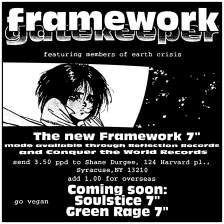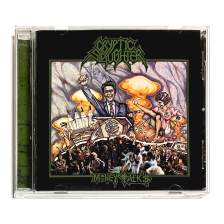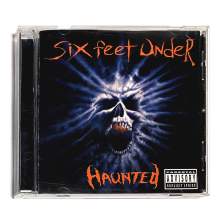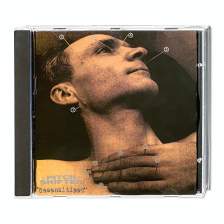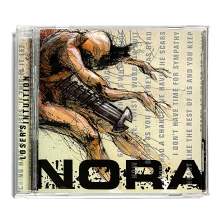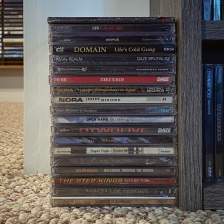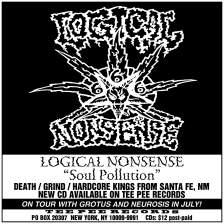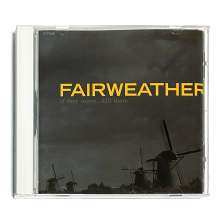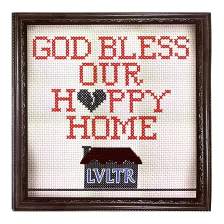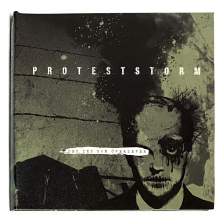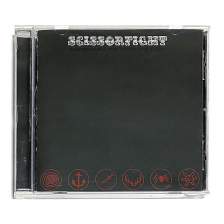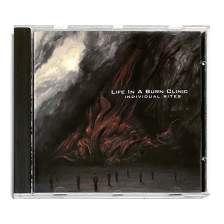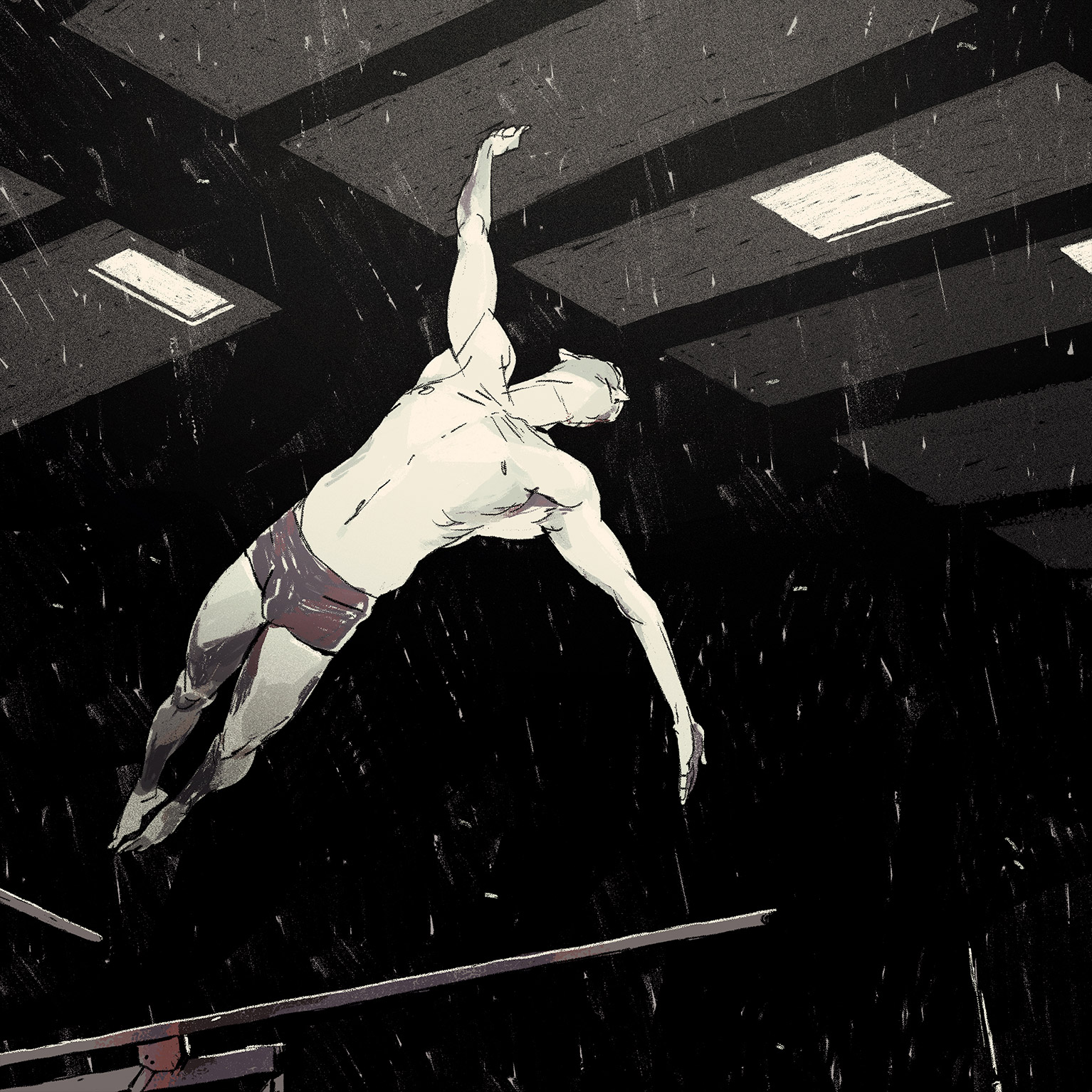
Sheffield, England's Firesuite randomly crossed my path exactly one week ago, and I was instantly blown away by what I was hearing. It was, in fact, another of those rare but powerful "Okay, whoa, this band should be huge!" moments. My mind quickly jumped toward processing their sound as a beautiful fusion of Aereogramme meets Coldplay—the latter's soaringly ambitious hooks and mainstream appeal counterbalanced by the former's harder-edged diversity and more "credible" emotional sensibilities. Midway through my very first listen to their sophomore full-length, Outlive Your Body, it was clear that this album will unquestionably be amongst my favorites of 2017.
In the days that followed, however, some real-world circumstances have set me back in such a way that I don't currently have the mental focus for my words to properly do this masterpiece justice (not that they ever would have). As a result, a part of me believes that Outlive Your Body found me at precisely the right time, and in the weeks to come, when I'm able to properly absorb its lyrical content (which I've not yet seen in full), that fact may become even more evident.
That being said, I sincerely encourage you to stream Outlive Your Body below—most notably tracks such as "Little Sacrifices," "Even Hand," "Harbour," "Wolves Below," or "Eulogy"—perhaps while perusing the ensuing interview with the band's guitarist/vocalist/visionary Christopher Anderson. I hope you'll be as moved by the material as I am...
Five years have passed since Firesuite's last release, and you were starting to present early tracks from Outlive Your Body as far back as the spring of 2016, so it's been a long road to arrive at this point. Talk a little bit about what this journey has looked like.
It was an odd, long, trying journey.
I was starting from scratch song-wise, which was fantastic. We initially started working with Tom [Henthorn], the producer who had recorded our first album and the Red World EP. We did a week or so of pre-production, at the end of which was a phone call where Tom said he didn't think he wanted to proceed as he couldn't wrap his head around the concept of it. At the time, this was pretty heartbreaking, but it turned out ultimately—even though it took a while—for the best. I was slightly hubristic and had an "I'll show you..." attitude, which didn't really last too long, thankfully.
We found a little studio high up in the hills of Sheffield called Old Pig Farm. It overlooks Oughtibridge and loads of horses in fields, it is incredibly idyllic. We met with the guys there and decided we'd decamp to work on the material we had. During the early part of writing and recording, we worked fast and the material was coming together, but we did soon hit a wall of sorts. We never really had a "plan" when we entered the studio, although deep down I had wanted the recordings to make up an album. It soon became clear that we didn't really have enough material—or at least enough quality material—to justify one. This was really tough, as we had recorded a lot. This was not a popular decision, and we also had to take into account our limited resources. There were other factors, too. We each have jobs and families, so unfortunately we do not have the luxury of dedicating all of our time to writing and recording. It's usually done in fits and starts, in blocks of studio downtime and availability. After the Red World EP, though, I had committed in my mind that we would never release anything that I wasn't completely in love with.
From this point, really, it became an all-encompassing rolling art project for me. I lost both of my paternal grandparents during this time, as well as a cousin, and some relationships with immediate family members began crumbling away beneath me. These experiences really fed into the writing, and I was thankful to have something to dedicate these energies to, as if I hadn't at the time, I'm not sure what I would have done. It probably wasn't particularly healthy, but I was able to compartmentalize all of these things that were happening and just focus on feeding the experience into the record—almost like I was approaching them from an objective stance—but this did reach a bit of a head and I got really low in 2016. I ended up writing two albums' worth of material, much of which comprised the rest of this album.
After a break, we went back into the studio and recorded two songs ("Womb" and "Edge of the Earth"), both of which immediately eclipsed a lot of what we had done. I then wrote "Spaceport," "Eulogy," "Little Sacrifices," and "Even Hand," which I was incredibly happy with and felt needed to be at least recorded to see what they would turn out like, and potentially be considered for the album. It was an uphill struggle to complete, though, and other collaborators came in to assist. Caroline Cawley came in and added some incredible vocals, and Dean Honer mastered the record, which just pulled all these lovely little details out of the recordings. The process has not been easy, but listening to the end result and how proud I am of how it turned out—the struggle was worth it.
Contrasting dynamics have always played a role in your sound, but this new material feels even more diverse, and at times leans a bit heavier—with a harder-hitting sense of energy and immediacy. In what ways has the songwriting grown—intentionally or otherwise—over the past five years since Red World?
When I started the band, I wanted us to be able to do anything we wanted. Whether this was acoustic stuff, instrumental stuff, or full-blown eight-minute math-pop-prog stuff. "A man's reach should exceed his grasp," I think is how it goes... I am not a proficient musician, though, Chris Minor [bass, guitar] holds that position in the band. But I think ambition is much more important than ability, both conceptually and musically. Plus, I know that whatever we attempt, it will be elevated by Chris and Rico [Storer, drums], who are spectacular musicians. They mask many of my shortcomings.
Songwriting-wise, it was a natural progression, really. There was a desire to accentuate each area we had tried before, but also move into different areas. "Edge of the Earth" is really unlike anything we had tried before, as is "Womb." Then you have things like "Little Sacrifices," which build on songs like "Of Little Faith," which have a lot of moving parts, but because we are more confident playing with one another the songs just have much more fluidity and are much more articulate, both lyrically and musically.
A lot of our material takes a long time to formulate, it needs to slosh around in my head for months before the right part or the right lyric appears. It usually doesn't take long to work out the dynamics in the rehearsal room, then the studio. Chris is perhaps the most naturally gifted musician I have ever been around, and watching him lock into something we had recently written makes everyone play better. One of my big regrets is that—given we aren't able to dedicate more time to playing and writing music—we're still in many areas only scratching the surface of what we can do.
The production is absolutely wonderful this time out as well. There's a balanced clarity and natural warmth that really allow more subtle textural details to shine through, making the overall impact more powerful. What was the studio experience like, and how did the sessions differ from Firesuite's past efforts?
This is thanks to John Sephton, who owns Old Pig Farm (the studio where we made the record). I can't emphasize how important he has been to me and how important his contribution to this album has been. We both produced the record, and he became an ally during the recording, particularly once the decision was made that we'd only release it if it was the best it could be. It was not an easy process, but then I never assumed it would be. That became even more apparent the deeper we got. He, along with recording engineer Steve Goodison, really pushed to get get the most out of the songs. I spent so many nights with John just adding little touches to the songs, redoing parts and fleshing out as much as possible what we were aiming for. He allowed us to use studio downtime and just make the record what it needed to be. After a while, it was pretty much him and me making sure it got over the finish line.
We have been lucky as a band when it comes to recording. Ideally, you want someone who sees something in the music and wants to dive in the mud with you to assemble the best version of it you can achieve. We recorded almost all of our early demos with a guy called Richard Taylor, much of them in his 6' by 12' bedroom. After this, we then found Tom Henthorn, who is a brilliant engineer and a really warm guy, and he really helped design and build the first album as well as the two releases either side of it. This last time was different in that it was—particularly during the last section of the recording—just me and John, whereas previously there had been more input from the then-current band members.
I've only seen the lyrics to one new song so far ("Little Sacrifices"), but it's been implied that the band tends to deal with fairly intense themes. I appreciate, though, that the approach seems to create an emotive atmosphere while remaining abstract enough to allow the listener to identify in their own way. Without "spoiling" or revealing more than you'd prefer, what can you share about the lyrical tone/direction of Outlive Your Body?
I started the band as a tribute to my little brother (who died in 2002), so lyrically there is always that in the background, and that still does feature heavily here. On this record, though, there was a desire to really push beyond what we should be able to achieve musically and lyrically given our limitations—reach, time, funds—which is where the title came from. Lyrically, there was a desire to touch upon the dynamic in the band and the disintegration of the band to some degree ("Sea Forgets My Name" deals explicitly with this), as well as addressing the effect grief has on you over a prolonged period of time ("Wolves Below," "Womb"). There's a lot of guilt on the record. Guilt over some of my dissolving personal relationships. Guilt over how you feel comfortable with wanting to wallow in grief despite how destructive it can be.
After the break we had, and returning to finish the record, I really wanted to try and create something as a tribute to my other siblings, too. We—each of us—have had a really poisonous relationship with our father, and coupled with what happened to my little brother, this has had a really destructive effect on us all in different ways. "Eulogy" is a direct result of this, and of everything on the record, this is the most personal and the thing I am most proud of. Completing the writing of the album felt like an enormous weight had been lifted.
At present, Outlive Your Body is going to be a digital-only release, but it sounds like there's the possibility of a physical product to follow. Are there any details you're at liberty to discuss there?
Well, there was a small chance at some point last year, which was why there was a delay. We could have released the record this time last year physically—though it would have been very different—but that fell through, sadly. There have been a couple of possibilities when it came to releasing the record on a physical format... I am very hopeful that we will someday, but if you have limited means this will always be a struggle. I would love to see Janet Sung's amazing art on vinyl someday, though.
Perhaps in part because I'm old and out of touch with the stream-driven age, but to me this material absolutely deserves a tangible, physical representation. I have to confess that I don't listen to a ton of music from this particular niche, and suspect that I'm unfamiliar with a lot of Firesuite's potential influences and contemporaries—even those most popular. But I know good music when I hear it, and Outlive Your Body is one of those special, ambitious albums that immediately gets me thinking, "Holy shit, this should be a 'big deal'..." As an over-enthusiastic listener, I'm so often frustrated by seeing such amazing talent struggle for the recognition it truly deserves.
That is very kind of you to say.
We do not fit in locally at all, so we have always struggled to gain any meaningful momentum there (that's really what "Harbour" is about), and no local labels are really interested. I think a lot of bands nowadays have to really get by on hoping that people will invest more time seeking them out. There is a lot of incredible music out there, but due to the sheer number of bands around, it's easy for things to be missed. A lot of bands I take a lot of influence from—Oceansize in particular—whilst much bigger than us, seem to struggle with the same kind of thing.
We are lucky in that the people that do find us tend to stick around. Recognition is a strange thing, though. As much as I would love to be able to sustain us through writing and recording music, I am incredibly proud of what we have managed to achieve given the restrictions we were working with, and realistically there are very few people who ever manage to achieve sustaining themselves solely through music.
Which brings me to the heart-breaking question... you've stated that Outlive Your Body "marks the end of the band as it is currently." Is this "the end" the end, or just the onset of some sort of significant change? Why?
The recording process was really protracted and tough. Sarah actually left way before the record was done and we almost totally split before we'd finished it. The band is very much my baby, but depends heavily on the central dynamic of me, Chris, and Rico. Without that, any band going forward would be drastically different, so I think it is perhaps for the best that it is set aside for now, and possibly for good. We each are involved in other musical projects, too, so the little time everyone was willing to invest became even less. John (Sephton, at the studio) recorded a bunch of additional material with me and we got some amazing collaborators to get involved—Craig B of Aereogramme, Caroline Cawley of Dystopian Future Movies, and Gareth Hughes ex-65daysofstatic—so I have been able to process the split by throwing myself into this project. That should hopefully see the light of day early next year under the guise of New Ghost.
It is really sad, and I'm still coming to terms with what it means, but... you know, we have created—what I feel, at least—is some incredibly cathartic, dynamic, and impactful music over a number of years. We're still on good terms and I have had some amazing experiences with all of the musicians that have played in Firesuite. I am very, very fortunate to have had the opportunity to play with them. If this is the end, which in my heart I feel like it is, then I think this album—and particularly the song "Lights"—is as good a way as any to go out.
***
Stream or download (name your price) Outlive Your Body on Bandcamp. You won't regret it.

